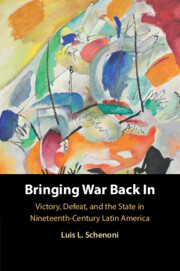6 - The State Capacity Ranking c. 1900
from Part II - Region-Wide Analyses
Published online by Cambridge University Press: 14 November 2024
Summary
Were nineteenth century war outcomes the main determinant of state trajectories in Latin America? In this chapter I turn from examining whether and to which degree war outcomes affected comparative state capacity levels and try to determining whether war outcomes were the main factor affecting the relative position of Latin American countries in the regional state capacity ranking. Exploring the conditions that predict the rank ordering of Latin American state capacity c. 1900—which has remained virtually the same ever since—has become a standard approach in the literature. In this chapter I explore this comparative historical puzzle by replicating previously used techniques. I use qualitative comparative analysis to show that accumulated victory and defeat throughout the nineteenth century is almost a sufficient condition for states to be in the upper and lower end of a state capacity ranking, respectively. I then use simple correlations to evaluate how war outcomes were related to a broad set of state capacity indicators at the turn of the century. Finally, I discuss case-specific expectations in longitudinal data that will be explored in the case studies.
Keywords
- Type
- Chapter
- Information
- Bringing War Back InVictory, Defeat, and the State in Nineteenth-Century Latin America, pp. 123 - 138Publisher: Cambridge University PressPrint publication year: 2024

